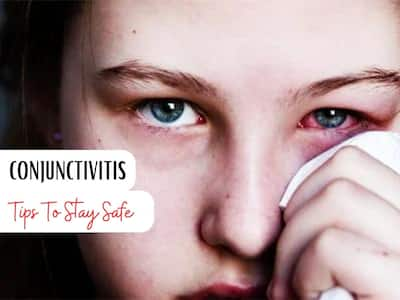
According to specialists, this year’s high humidity levels have led to an influx of patients with pink eyes and watery discharge into Outpatient Departments (OPDs).
India has been witnessing a sharp increase in eye infections, specifically conjunctivitis. Delhi and the surrounding areas have reported numerous cases of conjunctivitis amid the heavy rain. In an interview with TheHealthSite.com, Dr C M A Belliappa, Chief Medical Officer, RxDx Healthcare, and Consultant Medical Director, Practo, talks more about how conjunctivitis is contagious and why it’s crucial to take the proper precautions to stop the spread of the condition, especially in crowded places like public transportation during outbreaks or stressful situations. Let’s understand the causes behind this sudden surge in pink eye cases in the country and how to prevent the illness while travelling in a metro.
Conjunctivitis (Eye Flu): What Is It?
Conjunctivitis, also called pink eye or pink eye, is a contagious illness that causes inflammation of the conjunctiva, the translucent layer that covers the eye’s white area and the inside of the eyelids. It is typically spread by direct or indirect contact. Droplets from an infected person’s cough or sneeze can directly transmit an illness.
“In the monsoon months, conjunctivitis is not uncommon. However, this year, the number of cases is at an all-time high, mostly due to the incessant rain and floods that have plagued Delhi and many parts of the country. All kinds of viruses and bacteria have thrived in this unhygienic environment. Community spread has also increased, especially among school-aged children. However, the spread is nothing untoward. My recommendation is to maintain good hygiene at all times, use separate towels, and glasses, and don’t rub your eyes. If you do get the infection, talk to your family physicians or eye specialists and ensure to take antibiotic drops and not steroid ones,” Dr C M A Belliappa, told TheHealthSite.com.
What Causes Conjunctivitis?
Conjunctivitis can have various causes, such as viruses, bacteria, or allergies. Currently, the majority of cases are attributed to the adenovirus and its variants. The adenovirus is highly contagious, leading to a surge in cases. While bacterial infections may sometimes be present, their numbers remain negligible.
“Fortunately, most cases respond well to simple medications and supportive care, typically resolving within a week. However, seeking advice from healthcare providers is crucial, and it’s essential to avoid using over-the-counter products without proper guidance. Practising good hand hygiene and staying home from work or school if infected can help prevent the spread of the disease. In this scenario, telemedicine proves to be a valuable platform, especially with the large number of patients seeking assistance,” said Dr Belliappa.
How Does Conjunctivitis Spread?
As advised by Dr C. M. A. Belliappa, Chief Medical Officer of RxDx Healthcare and Consultant Medical Director of Practo, it is essential to take certain straightforward but effective precautions to protect your eyes and stop the spread of eye flu while using public transit.
Use Tissues and Dispose Properly
Use a tissue to prevent direct contact with your eyes if you must touch them to relieve irritation or for any other reason. After promptly throwing away used tissues in a tight bag, wash your hands.
Avoid Touching Your Face
Avoid touching your face, especially your eyes, nose, and mouth, when utilising public transit.
READ RELATED: Organ Transplantation: A Medical Science Miracle Saving Thousands Of Lives In India
Wear Protective Eyewear
When utilising public transit, think about putting on sunglasses or glasses with a prescription.
Maintain Safe Distances
Always attempt to maintain a safe distance from people exhibiting symptoms of conjunctivitis or other contagious diseases to reduce your risk of contracting them.
Wash Your Hands Regularly
Effective hand washing is a crucial defence against the spread of ocular flu. When utilising public transit, keep in mind to periodically wash your hands with soap and water for at least 20 seconds, especially after touching communal elements like handrails, doorknobs, and seats. Keep a small bottle of travel-sized hand sanitiser with at least 60% alcohol on hand for whenever you need to clean your hands.
Other Precautions:
- Maintain hand hygiene.
- Practise social distancing.
- Disinfect personal items.
- Avoid touching your eyes.
- Don’t share towels, sheets, or pillows.
(FACT: Since the sickness is not airborne, it cannot be contracted by staring at someone who has the eye flu.)
Total Wellness is now just a click away.
Follow us on
Don’t Miss Out on the Latest Updates.
Subscribe to Our Newsletter Today!
window.addEventListener(‘load’, (event) => {
$(‘#commentbtn’).on(“click”,function(){
(function(d, s, id) { var js, fjs = d.getElementsByTagName(s)[0]; if (d.getElementById(id)) return; js = d.createElement(s); js.id = id; js.src = “//connect.facebook.net/en_US/sdk.js#xfbml=1&version=v2.3”; fjs.parentNode.insertBefore(js, fjs);}(document, ‘script’, ‘facebook-jssdk’));
$(“.cmntbox”).toggle();
});
});







